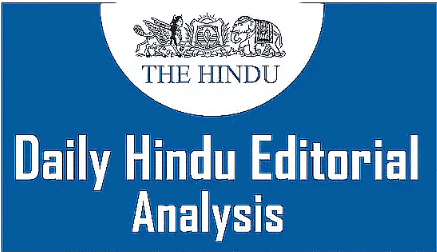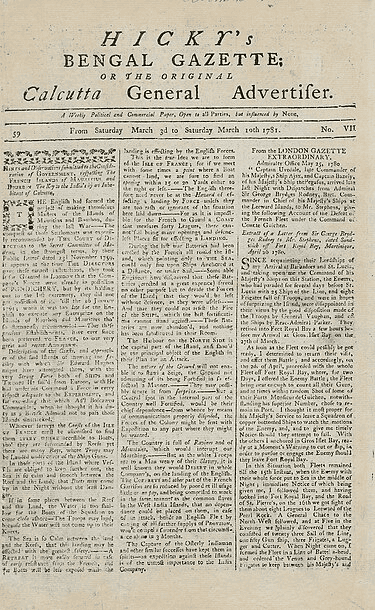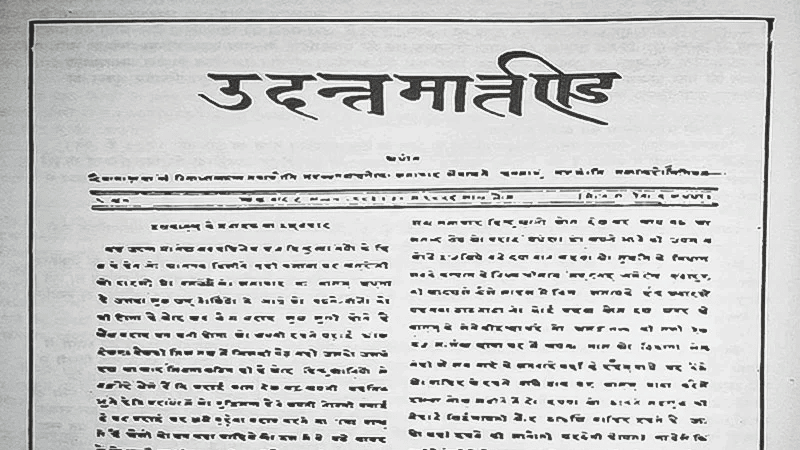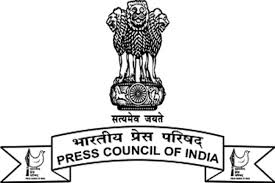The Hindu Editorial Analysis- 28th November 2024 | Current Affairs & Hindu Analysis: Daily, Weekly & Monthly - UPSC PDF Download

Fair Share
Why in News?
In a speech on the occasion of National Press Day last week, Union Minister Ashwini Vaishnaw called attention to the issue of fair compensation to media companies for the use of their content by big technology platforms. The Internet’s rapid growth has created a power imbalance between news publishers and large online enterprises which now set the financial terms for their use of content created by others. Many countries are grappling with this issue, and new regulations are taking shape.
- National Press Day is observed each year on November 16 in India.
- This day emphasizes the vital function that the press holds in a democratic society.
- The celebration recognizes the press's responsibility to provide accurate information, hold those in power accountable, and ensure the public is well-informed.
- The press is often called the "Fourth Pillar of Democracy" because of its powerful role in sharing information and monitoring the actions of the government.
- On National Press Day 2024, journalists, media organizations, and the general public will think about the importance of press freedom and the challenges it faces.
National Press Day 2024 Overview
National Press Day, celebrated every November 16, honours the freedom and responsibility of the press in India. This influential event was established by the Press Council of India in 1966with the meaningful aim of highlighting the role of media in defending democracy and promoting transparency. This day also reminds us of the press’s commitment to truth, accountability, and ethical journalism.
| National Press Day 2024 Overview | |
| Aspect | Details |
| Date | November 16, 2024 |
| Significance | Celebrates press freedom and accountability in India |
| Established by | Press Council of India (PCI), 1966 |
| Theme for 2024 | Changing Nature of the Press |
| Objective | To emphasize the importance of free, fair, and responsible journalism |
| Historical Context | Reflects on the press’s role in India’s independence and its contribution to democracy |
Why is National Press Day Celebrated?
- National Press Day serves as a reminder of the media's duty to the public and its crucial role in a democracy.
- This day marks the founding of the Press Council of India (PCI) on November 16, 1966.
- The PCI is a governing body that focuses on maintaining journalistic ethics and promoting freedom of expression.
- National Press Day is an opportunity for the Indian media to reflect on its responsibilities and consider its role in protecting the public interest.
- It is also a time to assess the credibility of the press in a time when media is rapidly growing and changing.
National Press Day Theme 2024
- The theme for National Press Day 2024 is “Changing Nature of the Press,” which emphasizes how the media is evolving in the digital age.
- This theme shows how technology is transforming the way we consume news, along with changes in audience behavior.
- It also points out the new challenges that journalists face in today's world.
- The theme invites people to talk about how to adjust to these changes while still protecting press freedom.
- It focuses on the importance of maintaining responsibility and ethical standards in journalism.
History of the Indian Press
- The history of the press in India goes back to the time of British rule when the first newspaper was launched.
- During the 19th century, the Indian press grew and changed a lot, playing a crucial role in raising awareness and fostering a sense of nationalism.
- Raja Ram Mohan Roy played an important part in promoting the freedom of the press by starting the newspaper Sambad Kaumudi and advocating for free speech.
- He challenged British censorship and supported various social changes.
- Newspapers such as The Hindu, Amrita Bazar Patrika, and Kesari helped inspire people and shape public opinion against British rule.
- Over the years, Indian journalism has undergone significant changes, influenced by British governance, the struggle for independence, and the challenges faced after gaining freedom.
The First Newspaper in India
- Hicky’s Bengal Gazette was the first newspaper in India.
- It was started by James Augustus Hicky in 1780.
- This newspaper was published weekly in English.
- Its location was Calcutta, which is now known as Kolkata.
- Hicky’s Bengal Gazette played an important role as a critical voice against British colonial rule.
- This newspaper helped to establish the foundation of India’s press.
- It set a standard for using journalism as a way to promote truth and resistance.

Father of the Indian Press
- James Augustus Hicky is often called the Father of the Indian Press because he was the first to bring journalism to India.
- He started a newspaper that played a key role in shaping the media in the subcontinent.
- Although his newspaper was eventually closed down due to censorship, his work laid the foundation for a vibrant and strong media presence in India.
- Hicky's efforts are significant as they marked the beginning of a rich history of journalism in the country.
- His contributions are still recognized today as vital to the development of media in India.

The First Hindi Newspaper in India
- Udant Martand was the first Hindi newspaper in India.
- It was published in 1826 by Pandit Jugal Kishore Shukla.
- The newspaper was based in Calcutta.
- It mainly catered to the needs of Hindi-speaking people in India.
- Despite its efforts, it faced financial issues and was ultimately closed down.
- However, Udant Martand played an important role in paving the way for regional-language journalism.
- This type of journalism is now a vital part of India's diverse media landscape.

Press Council of India (PCI)
- The Press Council of India (PCI) is an independent and legal organization.
- Its main role is to protect freedom of the press in India.
- It was reestablished in 1979 under the Press Council Act of 1978.
- PCI has two key goals:
- To ensure press freedom is maintained.
- To enhance the quality of newspapers and news agencies in India.

Historical Background of the Press Council of India
- The Press Council was created for the first time in 1966 following the suggestions of India's initial Press Commission.
- It was managed according to the Indian Press Council Act of 1965.
- However, the Council was shut down in 1975 during the time of the Emergency.
- Afterward, the Press Council Act of 1978 was enacted.
- This new act allowed the Press Council of India (PCI) to be re-established in 1979.
Structure and Composition of PCI
- The Press Council of India functions as a corporate entity that includes a Chairman and 28 members.
- The Chairman is usually a retired judge from the Supreme Court, appointed by a high-level committee made up of:
- The Chairman of the Rajya Sabha
- The Speaker of the Lok Sabha
- One member elected by the Press Council of India members
- The 28 members of the PCIcome from various fields to ensure thorough monitoring:
- Working Journalists: 13 members represent journalists, including:
- 6 who are editors
- 7 who are journalists other than editors
- Newspaper Management: 6 members are from the management side of newspapers, divided into:
- 2 from large publications
- 2 from medium publications
- 2 from small publications
- News Agencies: 1 member represents news agencies.
- Parliament Representatives: 5 members represent both Houses of Parliament, with:
- 3 nominated by the Lok Sabha Speaker
- 2 nominated by the Rajya Sabha Chairman
- Fields of Education, Law, and Literature: 3 members are nominated by:
- The University Grants Commission
- The Bar Council of India
- The Sahitya Akademi
- Working Journalists: 13 members represent journalists, including:
Role of the Press in Indian Freedom Struggle
- The Indian press was very important in the fight for India's freedom.
- It served as a strong tool against British rule.
- Newspapers such as Amrita Bazar Patrika, Keshari, and The Hindu helped people understand the harsh British laws, which sparked a sense of patriotism and encouraged many to join the struggle for independence.
- Leaders and freedom fighters like Mahatma Gandhi, Bal Gangadhar Tilak, and Jawaharlal Nehru effectively used the press to connect with and inspire the Indian people.
- Gandhi edited publications like Young India and Harijan, using them to share his thoughts on non-violence, truth, and Swaraj (self-governance).
- This period highlighted how powerful the press could be for social and political change, establishing it as a crucial element of democracy.
Freedom of Press in India
- The Constitution of India ensures freedom of the press as part of the right to freedom of speech and expression stated in Article 19(1)(a).
- This freedom is not absolute and is subject to some reasonable restrictions mentioned in Article 19(2).
- These restrictions consider factors like national security, public order, and decency.
- Even with these limitations, press freedom is crucial for maintaining democracy in India.
- Recently, there have been discussions about how media platforms are under pressure from political and commercial interests.
- These pressures raise concerns about the independence of journalism.
Press and Registration of Periodicals Act 2023
- The Press and Registration of Periodicals Act 2023 is a significant new law that affects the media.
- This act aims to update the process for registering both print and digital publications in India.
- It introduces measures to simplify the registration of publications.
- The act is designed to increase transparency in the media registration process.
- It sets up a system to better monitor media publications.
- This new law replaces older rules and recognizes the shift towards digital media, making it relevant for today's publishing industry.
- Under this act, certain information must be disclosed, such as:
- The frequency of publication
- Details about ownership
- These disclosures are important for maintaining transparency with the public.
- Understanding this act is crucial as it helps navigate the regulatory environment and supports the media's credibility with its audience.
Challenges Facing the Press in India Today
- Media Ownership and Bias: The concentration of media ownership can lead to worries about the independence of news reporting.
- Censorship and Threats to Journalists: There are cases of censorship and threats against journalists, which create a situation that can limit free speech.
- Misinformation and Fake News: The growth of social media has caused a rise in misinformation, making it harder for trustworthy journalism to thrive.
- Economic Pressures: The financial health of media organizations impacts the quality of their content and can lead to compromises in editorial standards.
Celebrations and Events on National Press Day
- On National Press Day 2024, various events, discussions, and award ceremonies are held throughout India to celebrate journalists and media professionals.
- The Press Council of India gives awards to exceptional journalists who show integrity, bravery, and a commitment to honest reporting.
- It is common to have panel discussions and seminars featuring media experts, government officials, and academics.
- These discussions focus on important topics such as current challenges, ethical journalism, and the future of the media industry in India.
The Future of the Indian Press
- The Indian media is constantly changing to keep up with new technologies and the evolving needs of its audience.
- Digital platforms have made it easier for people to access information.
- This increased access also brings challenges, such as the spread of misinformation and concerns about regulation.
- As traditional print media faces stiff competition from online sources, the importance of responsible and fact-based journalism is growing.
World Press Freedom Index 2024
- Published each year by Reporters Without Borders (RSF), the report ranks 180 countries based on how freely and independently journalists can work.
- The ranking assesses press freedom in five areas: political, legal, economic, sociocultural, and security conditions.
- The focus is solely on press freedom, not evaluating the quality of journalism or other wider human rights issues.
Global Highlights:
- A worldwide decline in press freedom was observed, with average scores falling by 7.6 points.
- Norway held the top position, followed by Denmark, while Eritrea ranked last at 180, with Syria just above it.
- Countries in the European Union showed the best results, with “good” press freedom mainly found in Europe, thanks to initiatives like the EU’s first media freedom law (EMFA).
- The Maghreb and Middle East regions had the worst rankings due to government-imposed restrictions.
India’s Rank in World Press Freedom Index 2024
- In 2024, India improved its rank to 159, up from 161 in 2023.
Conclusion
- National Press Day 2024 is a special occasion dedicated to recognizing the role of the press.
- This day celebrates India's dedication to maintaining freedom, democracy, and truth.
- The journey of the Indian press began with the launch of the first newspaper in India.
- Over time, the press has adapted to modern changes, especially with the rise of digital media.
- Despite these changes, the Indian press has kept its core values intact.
|
38 videos|5258 docs|1111 tests
|
FAQs on The Hindu Editorial Analysis- 28th November 2024 - Current Affairs & Hindu Analysis: Daily, Weekly & Monthly - UPSC
| 1. What is the main theme of the editorial "Fair Share"? |  |
| 2. How does the editorial address economic inequality? |  |
| 3. What solutions does the editorial propose to achieve a fair share for all? |  |
| 4. Why is social justice important according to the editorial? |  |
| 5. What role does government play in ensuring a fair share, as mentioned in the editorial? |  |
















